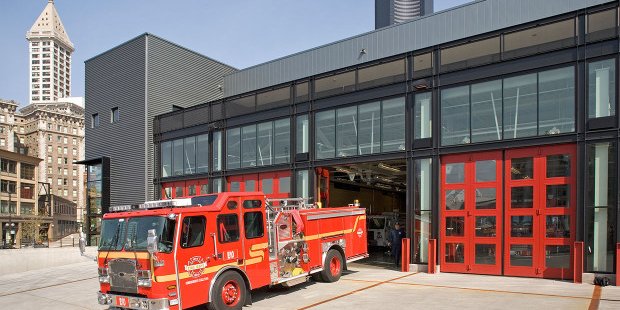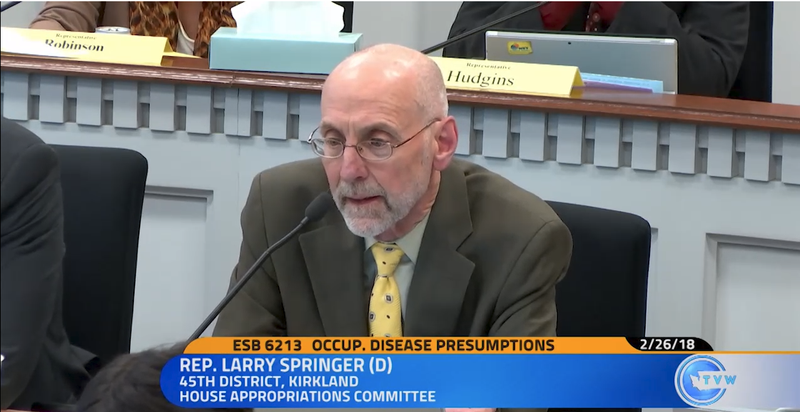House panel defeats first responder presumption expansion but moves PTSD presumption
Feb. 27, 2018

In a dramatic and surprising vote Wednesday afternoon, the House Appropriations Committee voted down Engrossed Senate Bill 6213 on a bi-partisan vote of 17 to 16.
Absent some extraordinary process in the remaining days of the legislative session, the vote effectively removes the issue from further consideration. The bill's companion in the House of Representatives, SHB 2633, failed to receive a vote in the House by the appropriate deadline.
Expanded Occupational Disease Presumptions
ESB 6213 would have expanded the statute that provides a presumption of occupational disease to firefighters for certain enumerated conditions in our workers' compensation system. Specifically, it would have added public fire investigators to the firefighter presumption; it would have added new presumptions for law enforcement officers in the area of acute cardiac events and infections; it would have added MRSA to the list of infections; and it would have added nine new cancers to the presumption.
The bill was supported by the unions representing firefighters and law enforcement officers, and has been proposed in similar form by these unions for several legislative sessions now.
However, with the change in partisan majorities in the Senate from Republican to Democrat this year, giving more union-friendly control of both the House and Senate, observers reasonably figured this might be the first responders' year to expand the presumption statute.
Sources of Opposition
The bill was resisted primarily by a coalition of the Washington Self-Insurers Association, the Association of Washington Cities, and the Washington State Association of Counties. The Association of Washington Business also provided opposition to the bill.
The basis of opposition has been two-fold: First, when the firefighters were first granted the presumption, and in years where it was narrowly expanded, it was on an agreement of labor and management that solid science demonstrated a sufficient epidemiological link between the contended condition and firefighting activities to merit a departure from the universal rule that the worker must prove the exposure that caused his or her disease.
By contrast, here, the link between the proposed new conditions and firefighting -- and especially fire investigation and law enforcement activity -- rested on very slim, and in some instances, no scientific backing.
Secondly, the fiscal impact of creating these new presumptions on local government would be profound. According to the initial fiscal note on SB 6123, the expanded presumptions would have increased State Fund claim costs by $16 million up front and then $7 to $8 million per year (not including the direct claim costs borne by self-insurers); claim costs of $53 million to local governments over the next six years, and $241 million in increased cost to state and local government over the next 25 years due to increased disability and pension claims in the Law Enforcement Officers and Fire Fighters (LEOFF) pension system.
An amendment adopted prior to Senate passage of the bill, which removed strokes as a presumed condition, lessened that fiscal impact by about half -- but the high cost remained a significant issue, especially considering that over the past decade, the State Fund has raised premium rates for covering law enforcement by 81 percent and for firefighters by 127 percent in an era where premium rates have otherwise remained relatively stable for employers overall.
An Alternative
The WSIA-AWC-WSAC coalition offered an alternative position on this issue: defer action on the proposed conditions in the bill, and instead create a body under the auspices of the Department of Labor & Industries' Safety & Health Assessment & Research for Prevention (SHARP) program that could be made up of epidemiologists and clinical practitioners, as well as stakeholders, to review on legislative request conditions and other first responder occupations for consideration in the presumption and make recommendations on which conditions and occupations are evidence-based. This was an approach used, for instance, in the post-9/11 Word Trade Center environment to determine which conditions to cover for the various benefit programs available to first responders in that tragedy.
Unfortunately, bill proponents resisted this concept, and amendments offered to create this alternative scientific review panel were voted down.
So the Senate bill moved from the Senate floor to the House Labor & Workplace Standards Committee, where it was heard and voted out without mark-up, and then to the House Appropriations Committee where it was heard and then set for a vote on February 26th, the deadline for such bills to be voted out of committee to remain alive.
A Surprising Vote in Appropriations
Before the vote, an amendment was offered by Rep. Joe Fitzgibbon, D-Burien, to narrow the bill a bit further in recognition of the still-extreme fiscal impact it would create. Fitzgibbon's amendment removed adenocarcinoma and MRSA from the list of presumed conditions, but kept the remaining structure of the bill. That amendment was adopted.
Speaking in favor of passing the further amended bill out of committee, Rep. Fitzgibbon argued the bill addressed "very real ailments" with "a very real frequency of occurrence" for firefighters and law enforcement officers, and that the body should "respect that service that [they] provide for our communities by acknowledging that with this bill."
Speaking first in opposition to the bill, Rep. Matt Manweller, R-Ellensburg, noted the established scientific process by which the presumption was originally created and through which over time some new conditions were added -- peer reviewed scientific studies noting at least a 1.5x higher mortality rate among firefighters than the general public.
Manweller went on to note that here, maybe only two of the dozen-plus conditions and occupations would meet that threshold. "We can't follow the science only when it is convenient for us," Manweller argued.
This is typically the point at which a vote would be called, one speaker having offered reasons pro and con.
But then Rep. Larry Springer, D-Kirkland, offered another perspective contrary to the bill. Springer, an 11-year veteran of the Kirkland City Council, including four years as mayor, said "I don't think we have thoroughly reviewed what the impact of this legislation is on our local government partners," and further, noting that there has been a process for adding conditions, Springer called for a "deliberate and dispassionate" review that could "establish a standard to rely on going forward."
The committee chair, Rep. Timm Ormsby, D-Spokane, then called for a vote and the 33 members of the committee voted the bill down 17-16. One Republican, Drew Stokesbary, R-Auburn, voted "yes" while two other Democrats joined Rep. Springer in voting "no," effectively killing the bill.
The vote was tense; as the roll-call of committee members proceeded, it would clearly be a tight vote. The announcement of the vote by the committee clerk was even held up while committee staff collected itself and conferred off to the side with Chairman Ormsby about the outcome before announcing it.
The momentary spark of drama illuminated the fact that bills brought up for a vote, whether in committee or on the chamber floor, are almost never, ever, voted down.
But Wait, There's More...
But then, in the committee's consideration of the very next bill, the regard for scientific process and solicitude for the costs of such claims on state and local government did not weigh as heavily, as the committee by a wide margin voted out SSB 6214.
SSB 6214 creates a brand new presumption for post-traumatic stress disorder (PTSD) for both firefighters and law enforcement officers, at an estimated cost to the State Fund of $45 to $125 million on incurred but not reported claims, and $3 to $8 million per year in new claims (to say nothing about the impact on self-insured counties and cities and the LEOFF pension system).
In all likelihood, SSB 6214 will pass and become law this session, particularly, from a political perspective, in light of the evident defeat of the other presumption bill.
Video
Click the image to watch the Appropriation Committee's consideration of both presumption bills Wednesday afternoon (approximately 10 mins total), including the momentary kerfuffle over ESB 6213 being voted down:
